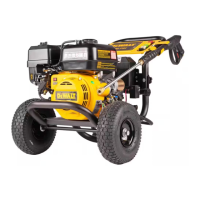9
DANGER: RISK OF EXPLOSION OR FIRE
WHAT CAN HAPPEN HOW TO PREVENT IT
• Spilled gasoline
and it’s vapors can
become ignited from
cigarette sparks,
electrical arcing,
exhaust gases and hot
engine components
such as themuffler.
• Shut off engine and allow it
to cool before adding fuel
to thetank.
• Use care in filling tank to
avoid spilling fuel. Move
pressure washer away
from fueling area before
startingengine.
• Heat will expand
fuel in the tank
which could result in
spillage and possible
fireexplosion.
• Keep maximum fuel level
1/2" (12.7 mm) below
bottom of filler neck to
allow forexpansion.
• Operating the
pressure washer
in an explosive
environment could
result in afire.
• Operate and fuel
equipment in
well‑ventilated areas free
from obstructions. Equip
areas with fire extinguisher
suitable for gasolinefires.
• Materials placed
against or near the
pressure washer can
interfere with its
proper ventilation
features causing
overheating and
possible ignition of
thematerials.
• Never operate pressure
washer in an area
containing dry brush
orweeds.
• Muffler exhaust heat
can damage painted
surfaces, melt any
material sensitive to
heat (such as siding,
plastic, rubber, vinyl
or the pressure hose,
itself), and damage
liveplants.
• Always keep pressure
washer a minimum of
4' (1.2m) away from
surfaces (such as houses,
automobiles or live plants)
that could be damaged
from muffler exhaustheat.
• Improperly stored
fuel could lead to
accidental ignition.
Fuel improperly
secured could get
into the hands of
children or other
unqualifiedpersons.
• Store fuel in an OSHA
approved container, in a
secure location away from
workarea.
• Use of acids, toxic or
corrosive chemicals,
poisons, insecticides,
or any kind of
flammable solvent
with this product
could result in serious
injury ordeath.
• Do not spray
flammableliquids.
• Shorting the battery
terminals together
may cause burns or
afire.
• Keep battery away from
other metal objects like
paper clips, coins, keys,
nails, screws, or other small
metal objects that can
make a connection from
one terminal to another.
DANGER: RISK TO BREATHING ASPHYXIATION
WHAT CAN HAPPEN HOW TO PREVENT IT
• Breathing exhaust
fumes will cause
serious injury or
death! Engine
exhaust contains
carbon monoxide,
an odorless and
deadlygas.
• Operate pressure washer
in a well‑ventilated area.
Avoid enclosed areas such
as garages, basements,etc.
• Never operate unit in or
near a location occupied by
humans oranimals.
• Some cleaning fluids
contain substances
which could cause
injury to skin, eyes
orlungs.
• Use only cleaning fluids
specifically recommended
for high pressure washers.
Follow manufacturers
recommendations. Do not
use chlorine bleach or any
other corrosivecompound.
DANGER: RISK OF FLUID INJECTION AND
LACERATION
WHAT CAN HAPPEN HOW TO PREVENT IT
• Your pressure
washer operates
at fluid pressures
and velocities high
enough to penetrate
human and animal
flesh which could
result in amputation
or other serious
injury. Leaks caused
by loose fittings or
worn or damaged
hoses can result in
injection injuries.
DO NOT TREAT
FLUID INJECTION
AS A SIMPLE CUT!
See a physician
immediately!
• Inspect the high pressure
hose regularly. Replace the
hose immediately if it is
damaged, worn, has melted
from contacting the engine,
or shows any signs of
cracks, bubbles, pinholes, or
other leakage. Never grasp
a high pressure hose that is
leaking ordamaged.
• Never touch, grasp or
attempt to cover a pinhole
or similar water leak on the
high pressure hose. The
stream of water IS under
high pressure and WILL
penetrateskin.
• Never place hands in front
ofnozzle.

